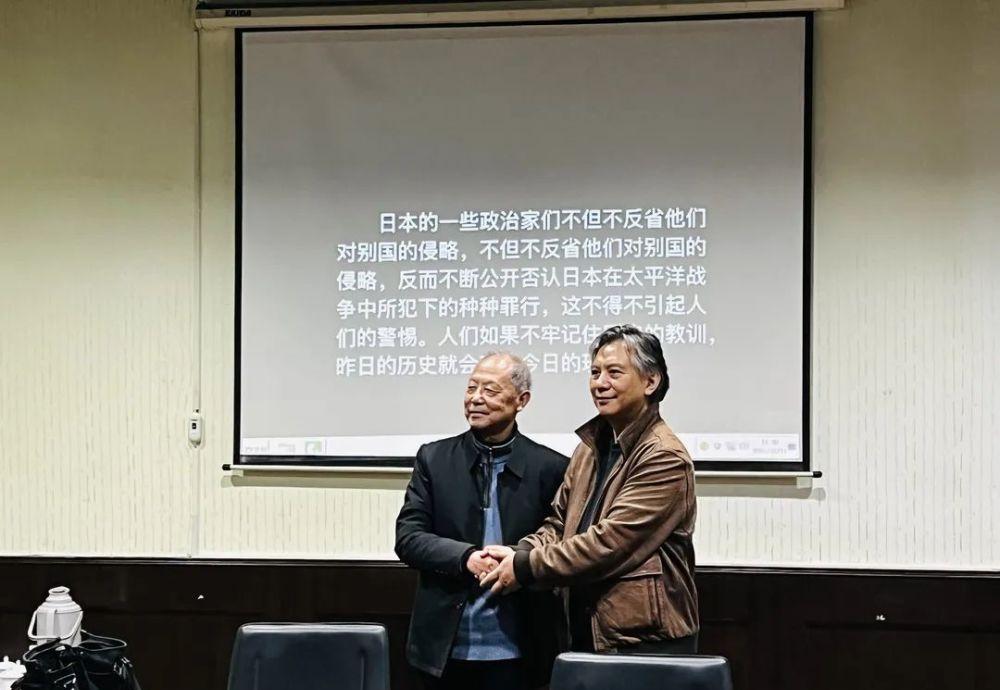"The 'traces' of history must not be erased, and to let the whole world remember the Nanjing Massacre, an anti-human event, I just did what Chinese should do, and this is also because of our eternal pursuit of peace."

On the morning of December 11, before the arrival of the Eighth National Day of Commemoration for the Victims of the Nanjing Massacre, the famous director Li Yang came to the Nanjing Folk Anti-Japanese War Museum and participated in the first small-scale screening of the documentary "Traces" in China, which was also the first documentary that fully reflected the Nanjing Massacre and was publicly screened overseas.
On December 12 last year, Li Yang donated the video materials and creative manuscripts of the documentary "Traces" on the theme of the Nanjing Massacre of the Japanese Invasion of China to the Nanjing Folk Anti-Japanese War Museum. After a year, through digital restoration and other means, this documentary filmed in 1994 was fully and clearly presented to domestic audiences for the first time.
In 1994, at the age of 35, Li Yang was studying at the German Film Academy. He had heard about the Nanjing Massacre since he was a child, but he found that this history was little known in Germany, so a documentary on the Nanjing Massacre became his graduation work.
He came to Nanjing twice, collected materials, interviewed historians and survivors of the Nanjing Massacre, and filmed for a whole month. Xia Shuqin, Chen Degui, Liu Yongxing, Xu Ziqiang... These survivors of the Nanjing Massacre all told the truth of history in the documentary "Traces". Xia Shuqin, who was 65 years old at the time, told the tragic experience and what she saw and heard during the Nanjing Massacre in front of the camera, and she said several times in a row, "I don't want to talk about this, my heart will be uncomfortable for several days."
Twenty-seven years have passed since the documentary was filmed, and only 61 survivors of the Nanjing Massacre remain on record. Some of the survivors of the Nanjing Massacre that Li Yang visited that year have passed away. These retained video materials are even more precious. "It adds another touch to the visual memory of the Nanjing Massacre, and the documentary itself has become a precious historical material, whether it is some survivors of the Nanjing Massacre, or the street scenes and life styles of Nanjing at the time of the documentary shooting, which no longer exist." Wu Xianbin, director of the Nanjing Folk Anti-Japanese War Museum, said.
In the context of the search for historical truth, in this nearly one-hour documentary, there are not only oral accounts of survivors of the Nanjing Massacre, but also the memories of Japanese military journalists and Japanese troops who invaded China, and some film clips are also provided by the Second Historical Archive of China. The documentary begins with a quote from Japanese Minister of Justice Shigeto Nagano on May 4, 1994, to the Mainichi Shimbun: "Regarding the Nanjing Massacre and so on, I think it is a fabrication, and it is wrong to say that the war was a war of aggression. Li Yang said that this is their denial, he later used oral and empirical evidence, but there was no comment in the whole film, "I am just a recorder's perspective, what I do is to objectively present historical facts."
It is understood that after the filming of "Traces" was completed, it was screened in Germany, France and other countries, and the German documentary channel even played it several times. "Many Germans were shocked when they saw it, because they never knew that the Japanese army invading China was so brutal." Li Yang said that he hopes to have the opportunity to let more young people see the documentary in China, "young people are the future, they carry the mission of remembering history and guarding peace."
At the screening, Li Yang also met Sun Zhaowei, a researcher of the Jiangsu Academy of Social Sciences and an expert on the history of the Nanjing Massacre, who was interviewed in the documentary. "I always remember this young man who interviewed me 27 years ago, when there were not many people studying the subject of the Nanjing Massacre in China, and I admired him for coming back from abroad to shoot such a documentary." Sun Zhaowei revealed that this is also the first time he has seen this documentary, although 27 years have passed, but the facts and characters in the documentary are standing, which is very shocking, especially the atrocities of the Japanese army, the urban appearance of Nanjing in the 1990s and the director's own camera search back and forth, vividly moving. "The greatest significance of seeing this documentary is that we must not allow the Japanese militarism that has brutally Chinese and mankind to be revived, and we must not allow such a historical tragedy as the Nanjing Massacre to be repeated." Sun Zhaowei said.
Source: Intersection reporter Huang Huan
Edit: Ning Ning